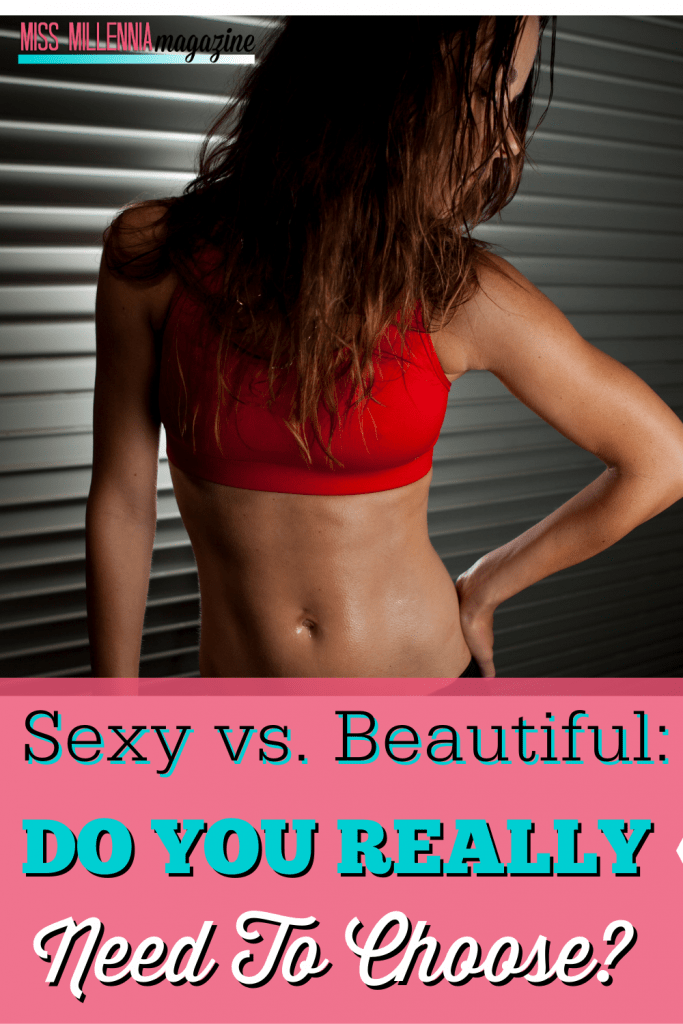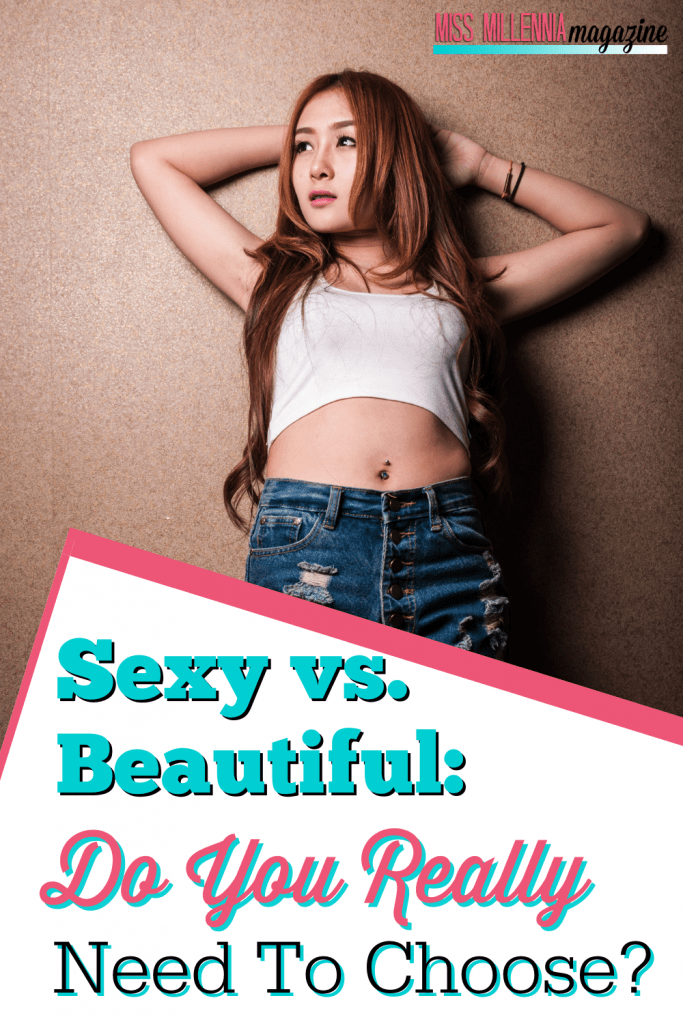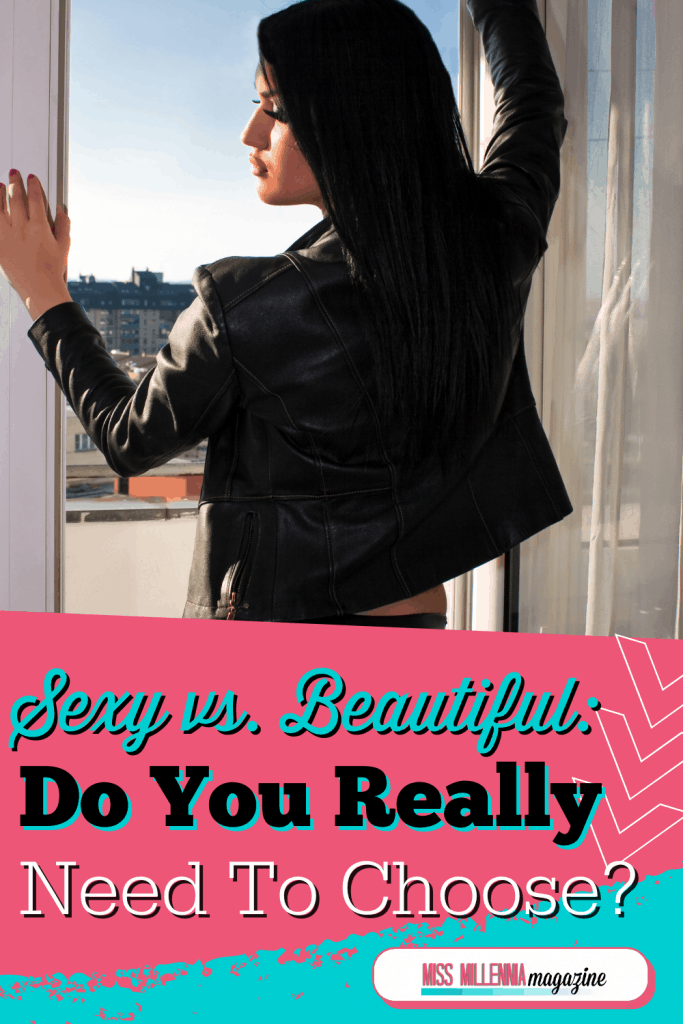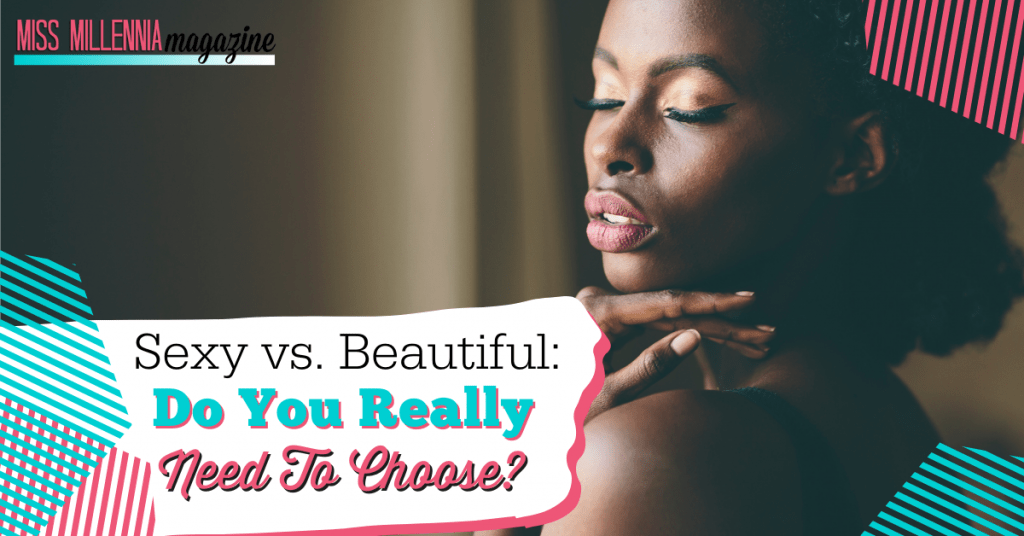Sexy vs. Beautiful: Do You Need To Choose?
It’s an age-old debate: sexy vs. beautiful. So, how do women want to be viewed?
First of all, let’s acknowledge that the premise of this debate is pretty sexist. I mean, only giving women two options? Telling us we can’t be both? And why are we so focused on women’s appearances in the first place?
Nonetheless, let’s consider this question.
When my friends tell me that a man has called them “cute” on a date, they cringe as they tell the story. They wonder why they describe the same way as a puppy.
If a man calls her “hot,” she will wonder why he didn’t call her beautiful and might even be offended at his sexual forwardness.
The prevalence of dating apps such as e-harmony makes this conversation even more important. We are often being chosen by (and choosing) potential partners primarily based on appearance.
My digging on this topic consisted mainly of scouring message boards about relationships, love, and everything.
So, to the question: Sexy vs. beautiful: Do you need to choose?
What did people say?
It is essential to keep in mind that the opinions and preferences of different people differ extensively, and it is also possible that the ideas expressed by one person do not necessarily represent those of all others. The statements that you presented imply that there are a variety of opinions on the word “sexy” and the implications it has.
Some women may have a negative connotation attached to “sexy” because they link it with being trashy. They may interpret it as a description that excessively emphasizes physical attractiveness while ignoring other attributes. Conversely, some people believe that sexiness is desirable, which may connect to glamour and the perception of provocativeness. According to this point of view, being sexy might be interpreted as a favorable characteristic.
In addition, the word “slut-shaming” suggests that there may be societal judgments or stigmatization linked with the adjective “sexy,” especially about women. It may be why some women would instead be referred to as “sexy” rather than “beautiful,” given that the latter term is likely to be perceived as more subjective and less likely to elicit judgment or criticism.
It is necessary to acknowledge that these statements reflect particular points of view and views. How people understand and make sense of words like “sexy” can be shaped by various circumstances, including those that are cultural, personal, and societal. There may be multiple perspectives on this matter, which may shift over time.
What woman wouldn’t want to be called beautiful?
This question shows an essential desire to be liked and accepted for how they look on the outside, which everyone shares. The concepts of “beautiful” and “sexy” can be understood in several different ways depending on cultural norms, one’s own experiences, and the expectations of society.
- The Multifaceted Notions of Beauty and Sexiness:
Beauty comprises many physical characteristics, such as body type and facial features, natural beauty, and a person’s style. It is a unique idea that is interpreted differently by each individual. On the other hand, “sexy” is more concerned with sexual attractiveness and might refer to one’s outward look, demeanor, or clothing.
Both “beautiful” and “sexy” elicit distinctive responses, with “beautiful” putting more of an emphasis on aesthetic attractiveness and “sexy” putting more of a focus on sensuality and attraction.
Cultural norms and societal expectations impact women’s self-perception of themselves. The English language, in and of itself, provides a varied range of terms to describe physical attractiveness. This variety of words reflects the intricacies and complexity connected with beauty.
Icons like Marilyn Monroe and Scarlett Johansson exhibit changes across time, showing the evolving norms that impact women’s self-image. It is true even though both women are beautiful in their unique ways.
Women who want to look sexy and beautiful by others can be influenced by their personal experiences and the circumstances in which they find themselves. Self-Perception and Individual Preferences. Both descriptors are significant in romantic relationships, but “beautiful” typically refers to a more profound connection beyond the physical, and “sexy” emphasizes an allure within more personal contexts.
Preferences can change based on the people who are involved and the kind of relationship that exists between them.
- Navigating the Fine Line and Self-Esteem Issues:
The boundary between being perceived as beautiful and sexy might be acceptable. When someone compliments your appearance, it’s natural for you to experience a sense of pride and respect for yourself. On the other hand, hearing someone refer to you as “sexy” may make you feel objectified or cause problems with your self-esteem.
It can be difficult for women to reconcile their sense of self-worth with the demands of society, particularly when society places a lot of emphasis on physical characteristics.
- Reclaiming Empowerment and Redefining Beauty:
There is a growing trend among women to redefine beauty and embrace their distinctive characteristics and attributes. This movement is also known as the “reclaiming empowerment” movement. It includes rejecting the limiting definitions imposed by society and embracing a more comprehensive range of characteristics contributing to personal attractiveness.
Specifically, this applies to the concept of attractiveness. Women are reclaiming their right to define themselves according to their standards, which includes celebrating their physical attractiveness and sensuality while emphasizing their mental and emotional prowess and physical and emotional resilience.
Unfortunately, it seems women believe they must choose whether or not to be attractive to the opposite sex. The women on the forums seemed to think that choosing “beautiful” over “sexy” eliminates an appealing part of themselves.
And who can blame them for feeling that way?
If someone told you that a sultry, red lipstick pout made you more attractive to a potential mate than a pretty face, many women would buy that lipstick in a heartbeat. However, we can wear that lipstick whenever possible and still look classically beautiful. I mean, Audrey Hepburn rocked red lips all the time!
Sexy vs. Beautiful: The Comparison
Words used to describe sexily:
- unrefined
- carnal
- hot
Words used to describe beautifully:
- elegant
- endearing
- mysterious
- gorgeous
But why is it a choice?
Trick question: it isn’t.
It seems that the word “sexy” has become synonymous with sex itself. However, the adjective refers to qualities that make a person attractive.
Beauty encompasses all kinds of attractiveness, strictly on definition alone. And so, sexiness is something beautiful, just as beauty is sexy.
More importantly, intelligence and humor can be both sexy and beautiful. The two, in actuality, are intertwined.
Making a case for sexy
Why shouldn’t you feel sexy?
No, feeling sexually attractive does not make you trashy, nor does it make you less beautiful. We need to put an end to equating sexy to trashy and instead tie it to self-love.
You can love yourself and your unique sex appeal without being forced to choose whether or not you are deemed “classy.” You can be classy and sultry, beautiful and sexy, and anything.
By whose standards?
In reality, we are only judging ourselves.
In my reading, I found articles and conversations written by women for women.
Women used the words and mindsets shared above. They’re shaming sexy and empowering beauty and still choosing sexy in the end out of fear of not being attractive.
Participants were arguing their stances on the matter, telling other women why they “chose” to be sexy over beautiful, and justifying for what reasons it was the right choice.
Ladies, don’t make a case against yourself. And certainly don’t compromise. Several factors go into attractiveness, and beauty combines all those qualities, including sexiness.
Breaking Stereotypes: Redefining Beauty in the Modern Era
- In the modern era, the concept of beauty is undergoing a transformative shift, challenging traditional stereotypes and redefining our understanding of attractiveness. In particular, the notion of sexual attraction, often associated with the term “sexy,” and the broader idea of beauty have taken on new meanings, acknowledging that different things can be considered attractive.
- Historically, a “sexy woman” was typically depicted as someone who embodied a specific physical ideal, often focusing on overtly sexualized characteristics. However, society gradually recognizes that beauty encompasses many qualities beyond sexual allure. A beautiful woman can be admired for her inner qualities, such as intelligence, kindness, or confidence, which can enhance the depth of a romantic relationship beyond mere physical attraction.
- The term “sexy” has evolved to encompass various interpretations depending on individual preferences and cultural contexts. Sexy people may exude confidence, charisma, and a sense of empowerment rather than simply possessing specific physical features. On the other hand, beauty embraces a more holistic perspective, acknowledging that beautiful people can captivate us with their unique qualities, appearance, or charm, transcending a narrow definition based solely on sex appeal.
- In contemporary society, there is growing recognition that attractiveness is subjective and influenced by personal taste. Individuals are drawn to various types of women, finding beauty in diverse physical characteristics, personalities, and traits. What one person finds cute, another may find hot or beautiful, emphasizing the adage that beauty is truly in the eye of the beholder.
- It is important to note that beautiful and sexy are not mutually exclusive categories. A person can possess both qualities simultaneously or exhibit them in different situations. For instance, someone may find a woman beautiful for her elegant appearance in a formal setting while considering her sexy when she confidently flaunts a stylish outfit or expresses her sexuality in intimate settings.
- Stereotypes surrounding beauty restrict our understanding of attractiveness and limit the given room for individual expression. By breaking free from these constraints, we can appreciate the diverse manifestations of beauty and celebrate the unique qualities different individuals bring.
- It’s crucial to remember that physical appearances, such as facial features, body parts, or clothing like high heels, can contribute to one’s overall impression but should not be the sole or main attraction. For example, small animals and cute appearances can elicit positive emotions and appeal to our innate visual nature, but they don’t necessarily define beauty or sexiness in human terms.
- First impressions play a significant role in our perception of others, and it’s natural to use positive words like cute, hot, or beautiful when describing people. However, as we develop deeper connections and engage in committed relationships, we appreciate that true beauty extends beyond initial physical allure. The qualities that make someone a good person, character, values, and actions, become increasingly important factors that contribute to a lasting and meaningful bond.
- In a nutshell, the modern era is witnessing a shift in our understanding of beauty, sexual attraction, and the terms “sexy” and “beautiful.” We are breaking stereotypes by recognizing that attractiveness comes in various forms and is subject to personal interpretation. Embracing individuality and appreciating people’s different qualities allows us to redefine beauty on our terms, fostering a more inclusive and accepting society.
Looking Beyond Surface-Level Impressions: The Power of Inner Beauty
- In a world centered around outward appearances, there is a rising appreciation for the profound effect of inner beauty. While first impressions may catch our attention, the traits under the surface can fascinate and inspire.
- Inner beauty comprises a variety of characteristics that extend beyond outward attractiveness. The brightness comes from a person’s character, values, generosity, and compassion. The warmth and honesty within make someone genuinely engaging and attractive.
- At first look, surface-level impressions such as one’s physical appearance or style can be tempting. They frequently lack depth and substance, however. Inner beauty, on the other hand, can forge deep and lasting connections that transcend transitory external allure.
- Inner beauty can touch hearts, affect perceptions, and impact lives. We are drawn to someone who embodies inner beauty because of their honesty, genuine nature, and ability to make others feel seen and valued.
- Inner beauty has the power to motivate and inspire. It can bridge gaps, break down boundaries, and promote a sense of connection and understanding. Looking beyond first impressions opens up possibilities where genuine connections and profound relationships can emerge.
- Recognizing that inner beauty is not limited to a chosen few is critical. It is a trait that exists within every person and must be nourished and cultivated. It reflects one’s personality, integrity, and inner strength.
- In a society that frequently places a premium on outward looks, appreciating the power of inner beauty can result in a dramatic shift in perspective. We begin to grasp each individual’s richness and depth when we recognize the relevance of virtues such as empathy, compassion, and genuineness.
- Furthermore, inner beauty can radiate outward and positively impact the world. We become catalysts for kindness, love, and understanding when we cultivate our inner beauty. Our actions, words, and intentions reflect the beauty within us, creating an indelible impression on those we meet.
- It is crucial to remember that true beauty is within a world that can sometimes be superficial and judgmental. By looking beyond surface-level impressions, we unlock the power of inner beauty and embark on a journey of self-discovery, authenticity, and meaningful connections.
Being “sexy” does not make you “slutty,” or a woman of lower class. Sensuality can be attractive and is only one of the many qualities contributing to your beauty. Choosing one adjective over another to describe yourself is just unnecessary. Beauty is not a negative thing and is not just about physical appearance.
You are beautiful regardless of what you look like! Everyone has their preferences, and you do not need to worry about them. You are perfect, and be the person who you are. Never let other choices break your confidence and inner beauty.
You don’t have to choose to be just one thing; you shouldn’t rely on physical appearance. You are a well-rounded, complete human being capable of so much. So go out and be all of it!









